Political parties: A special purpose vehicle for Nigerian politicians
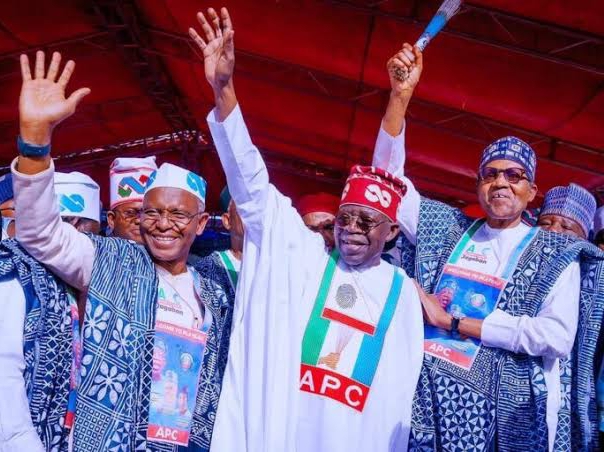
Image Source: ThisDay Live
By Peter Okoye
Political parties have been the bedrock of every democracy in the world. Democracy, often described as the government of popular consent, is made possible through the involvement and participation of political parties, whose members are ideologically bound together.
In its conceptualisation, a political party is an organized group of people who share similar political opinions, interests, and beliefs, with the aim of gaining political power and governing a state. From this concept, one thing is clear: sharing similar political beliefs, which is akin to the ideology that bonds members of such political party permanently.
Nigeria has been practicing democracy, like other democracies around the world, since 1999, following a long period of military rule. This transition was preceded by democratic experiments during the First Republic (1960–1966), Second Republic (1979–1983), and Third Republic (1992–1993). Nigeria is currently in its Fourth Republic, but the nature of politics that has been and continues to be practiced is nothing short of a mockery of democracy itself.
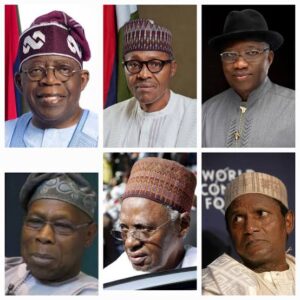
Political parties in the country have been rocked by waves of defections and cross-carpeting since her first republic. Political party defection is a frequent and common occurrence in the Nigerian political spectrum – a phenomena that has dubbed Nigerian politicians the slur – “waka waka politicians”.
The constitution, presumably, in order to uphold political political ideologies held by various political parties in Nigeria provided in section 68 (1) that once a lawmaker defects to another political party, the lawmaker ceases to be a member of the House of Representatives, Senate or State Assembly as the case may be. This section, as it were, is not absolute and outright considering the proviso, which appears to be a safe haven , accompanying the provision.
A perfect example to this was what was reported in Rivers State in early 2024 where 27 lawmakers in the state assembly defected from the People’s Democratic Party (PDP) to the All Progressives Congress (APC) just a few weeks after they were sworn in. Yet, after all the constitutional and legal interpretations and critical analysis in the media to their defection, nothing happened to the 27 lawmakers and they got away with it.

History reminds us that one of the factors that made the first republic of Nigeria unpopular was the massive defections and power tussle that characterized the political parties of that era, especially, that of Chief Obafemi Awolowo and his deputy in the Action Group (AG), Chief Samuel Akintola. Awolowo saw Akintola as an overambitious and egocentric individual that wanted to supplant him as the leader of the party and thus must take action to remove him.
The introduction of “democratic socialism” as the new party ideology polarized members of the AG into antagonistic groups. At the climax of the crisis saw the party split into two factions and Chief Awolowo imprisoned on the charges of treason. This political scenario had political undertones from the Northern People’s Congress (NPC) controlled federal government who saw an ally in Chief Akintola.
Developed democracies like the United States, United Kingdom, Germany, the Netherlands and France have politicians with over four decades of experience in politics keeping faith in only one party affiliation and ideology which resonates with their principles and virtues as human beings; unfortunately such can’t be found in Nigerian politicians.
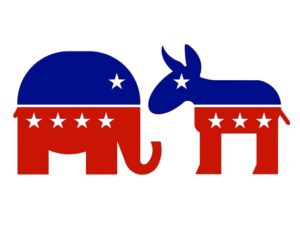
The US practices a two party system in which politicians are either Democrats, Republican or independent of the two. The Democratic party has an ideology of social equality, mixed economy and a belief in the role of government in addressing social issues. It runs on liberal social policies and is located at the centre-left.
The Republicans on the other hand is characterised by a limited government participation in economic matters leading to a free market economy where private individuals have the freedom to operate with minimal government intervention. It runs on conservative social policies especially when it comes to sexual orientation and identity. They believe in traditional values and it is at the centre-right.
READ MORE
Donald Trump’s presidential inauguration: 10 vital things you need to know
“Stop raiding like thieves!” Nigerians slam EFCC over midnight house invasions…what to know
Double dilemma: Should hardworking men choose submissive but broke women or alpha and wealthy ones?
The UK operates a multi-party system. The ruling Labour Party advocates for a welfare state, worker’s rights and public ownership of key industries and services. The ideology of the party adopts a social democracy and the party is at the centre-left. The Conservative party (Tory party) to which former prime minister was a member support a free market capitalism, private enterprises and lower taxes, they support a limited role of the state in the economy and advocates for traditional values. It is at the centre-right and its ideology is a Liberal Conservatism.
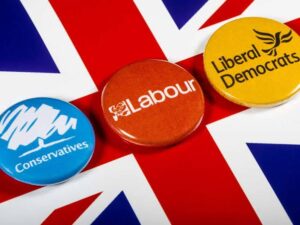
The Liberal Democrats, however holds a strong belief in individual rights, civil liberties and personal freedom. It support a mixed economy with a balance of public and private sectors. It is at the centre and it adopts Social Liberalism as its ideology.
Lastly, the Green Party focuses on climate and reducing carbon emissions. They support social justice and addressing inequality and poverty and advocates for a green economy. It is on the left wing and its ideology is on Green politics and Socialism.
These are clear-cut ideologies which guides each of these political parties and which prospective members must look out for before joining any of them to ensure that it aligns with their principles as rational human beings.
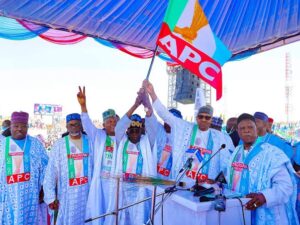
Coming home to Nigeria, the ruling party, APC is generally considered to be a party that favours a controlled market economic policies, and a strong and active role for government regulation. A substantial number of its political leaders are followers who subscribe to the social democratic political philosophy and it is at the centre-left.
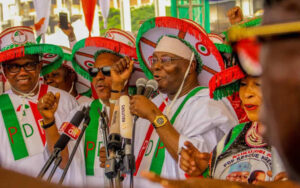
On the other hand, the main opposition party, the PDP, favours free-market policies which support economic liberalism, and limited government regulation. The party operated through conservative fiscal policies to push for economic reforms when Olusegun Obasanjo was president in 2003. The party is at the centre-right.
The Labour Party which recently came into political limelight following the gains it made in the 2023 general elections is a party anchored on the protection of worker’s interests, wellbeing and rights. It is the political wing of the Nigerian Labour Congress (NLC). The party also support a free-market economy and it is on the centre-right.
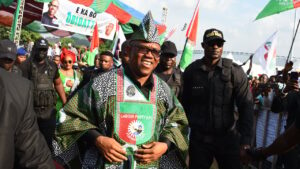
Political parties can usher in development and progress in any democratic setting only when it has clear-cut ideologies and party disciplines. When members are not associated with corrupt practices that will only benefit them, they will see to it that the party’s ideology will be utilised and implemented to bring about development in such country.
As desperate as it seems, the few months before any election season in Nigeria sees the political transfer window open where politicians use the opportunity to enter the “special purpose vehicle” of their choice and drive to the government buildings in order to reap the political spoils. Some of the factors that propel politicians to defect among diverse political parties includes: lack of trust in party hierarchy, total disregard and dearth to party ideologies by members, lack of transparency in party activities including primary elections and nominations, internal party division and factions, excessive pursuit of political ambitions among other plethora of factors.
According to Olarenwaju John Shola in his contributions on “Political Parties and Poverty of Ideology in Nigeria” asserts that “Nigerian political parties seem to be suffering from ideological barrenness unlike what is obtainable in advanced democracies”. He opined that “Unless leaders of political parties form and maintain political ideologies on their stand, cross-carpeting from one party to another will continue to exist, it is only in Nigeria that candidates work against their parties when they fail to secure party tickets to contest elections”.
To be specific, one of the core reasons why politicians defect on Nigeria is the dearth of political ideologies and the absence of it on parties will continue to propel mass defections. This is really unfortunate in the literal sense.

